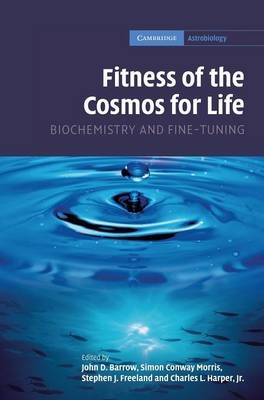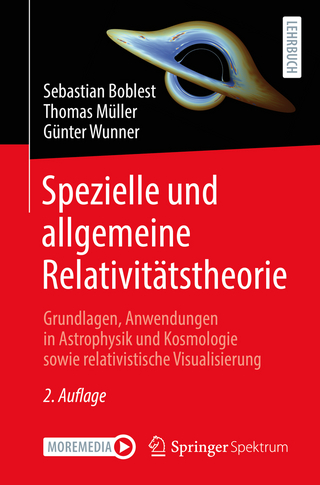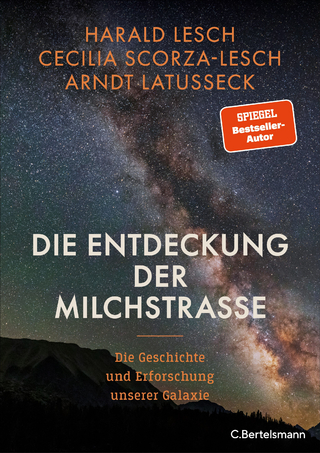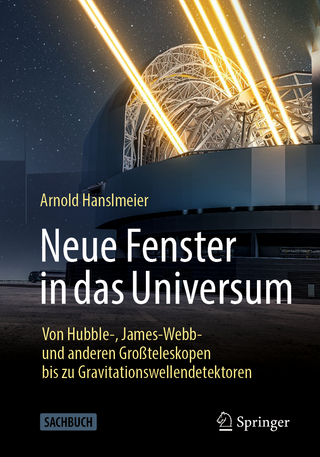
Fitness of the Cosmos for Life
Cambridge University Press (Verlag)
978-0-521-87102-0 (ISBN)
This highly interdisciplinary 2007 book highlights many of the ways in which chemistry plays a crucial role in making life an evolutionary possibility in the universe. Cosmologists and particle physicists have often explored how the observed laws and constants of nature lie within a narrow range that allows complexity and life to evolve and adapt. Here, these anthropic considerations are diversified in a host of new ways to identify the most sensitive features of biochemistry and astrobiology. Celebrating the classic 1913 work of Lawrence J. Henderson, The Fitness of the Environment for Life, this book looks at the delicate balance between chemistry and the ambient conditions in the universe that permit complex chemical networks and structures to exist. It will appeal to a broad range of scientists, academics, and others interested in the origin and existence of life in our universe.
John D. Barrow is Professor of Mathematical Sciences in the Department of Applied Mathematics and Theoretical Physics at the University of Cambridge, and Director of the Millennium Mathematics Project. He is the author of The Artful Universe Expanded (Oxford University Press, 2005) and The Infinite Book: A Short Guide to the Boundless, Timeless and Endless (Cape, 2005), as well as co-editor of Science and Ultimate Reality: Quantum Theory, Cosmology and Complexity (Cambridge University Press, 2004). Simon Conway Morris is Professor of Evolutionary Palaeobiology at the Earth Sciences Department, University of Cambridge. He is the author of Life's Solution: Inevitable Humans in a Lonely Universe (Cambridge University Press, 2003). Stephen J. Freeland is Assistant Professor of Biological Sciences at the University of Maryland, Baltimore. His research focuses on the evolution of the genetic code. Charles L. Harper, Jr. is an astrophysicist and planetary scientist and serves as Senior Vice President of the John Templeton Foundation. He is co-editor of Science & Ultimate Reality: Quantum Theory, Cosmology and Complexity (Cambridge University Press, 2004).
Foreword: The improbability of life George M. Whitesides; Part I. The Fitness of 'Fitness' - Henderson in Context: 1. Locating 'fitness' and Lawrence J. Henderson Everett Mendelsohn; 2. Revisiting The Fitness of the Environment Owen Gingerich; 3. Is fine-tuning remarkable? John F. Haught; 4. Complexity in context: the metaphysical implications of evolutionary theory Edward T. Oakes; 5. Tuning fine-tuning Ernan Mcmullin; Part II. The Fitness of the Cosmic Environment: 6. Fitness and the cosmic environment Paul C. W. Davies; 7. The interconnections between cosmology and life Mario Livio; 8. Chemistry and sensitivity John D. Barrow; 9. Fitness of the cosmos for the origin and evolution of life: from biochemical fine-tuning to the Anthropic Principle Julian Chela-Flores; Part III. The Fitness of the Terrestrial Environment: 10. How biofriendly is the universe? Christian de Duve; 11. Tuning into the frequencies of life: a roar of static or a precise signal? Simon Conway Morris; 12. Life on earth: the role of proteins Jayanth R. Banavar and Amos Maritan; 13. Protein-based life as an emergent property of matter: the nature and biological fitness of the protein folds Michael J. Denton; 14. Could an intelligent alien predict earth's biochemistry? Stephen J. Freeland; 15. Would Venus evolve on Mars? Bioenergetic constraints, allometric trends, and the evolution of life-history invariants Jeffrey P. Schloss; Part IV. The Fitness of the Chemical Environment: 16. Creating a perspective for comparing Albert Eschenmoser; 17. Fine-tuning and interstellar chemistry William Klemperer; 18. Framing the question of fine-tuning for intermediary metabolism Eric Smith and Harold J. Morowitz; 19. Coarse-tuning the origin of life? Guy Ourisson; 20. Plausible lipid-like peptides: prebiotic molecular self-assembly in water Shuguang Zhang; 21. Evolution revisited by inorganic chemists R. J. P. Williams and J. J. R. Fraústo da Silva; Index.
| Erscheint lt. Verlag | 6.12.2007 |
|---|---|
| Reihe/Serie | Cambridge Astrobiology |
| Verlagsort | Cambridge |
| Sprache | englisch |
| Maße | 170 x 244 mm |
| Gewicht | 1170 g |
| Themenwelt | Naturwissenschaften ► Biologie |
| Naturwissenschaften ► Physik / Astronomie ► Astronomie / Astrophysik | |
| ISBN-10 | 0-521-87102-6 / 0521871026 |
| ISBN-13 | 978-0-521-87102-0 / 9780521871020 |
| Zustand | Neuware |
| Haben Sie eine Frage zum Produkt? |
aus dem Bereich


